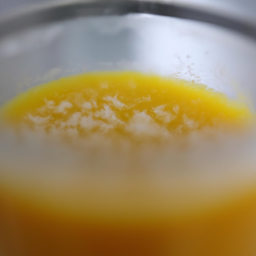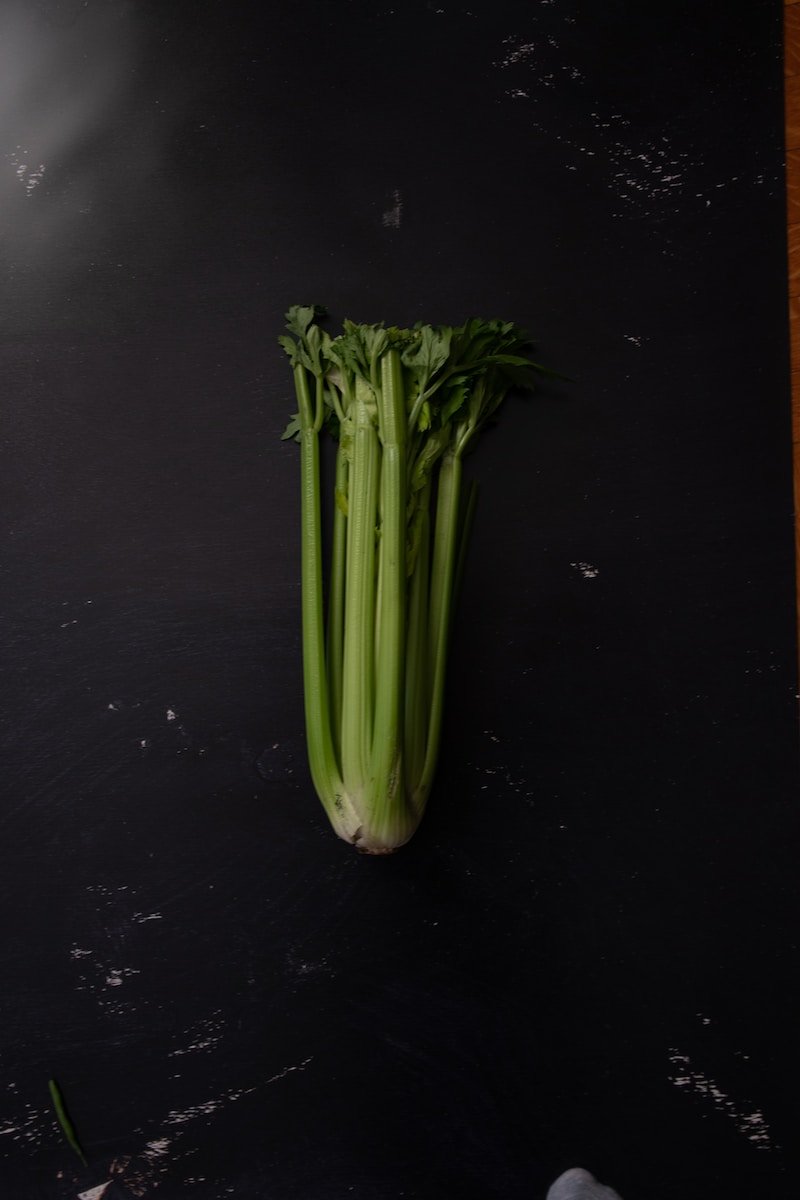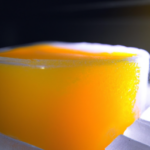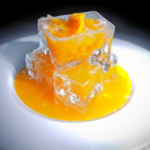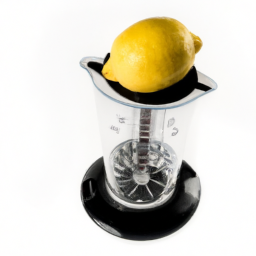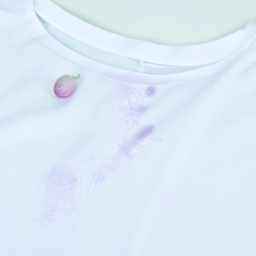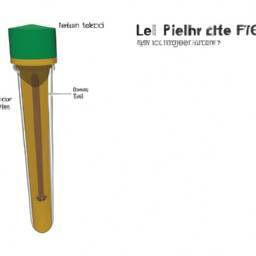I have always been fascinated by the science of freezing and the different factors that impact it. I am especially curious about how long it will take for orange juice to freeze. Does it solidify quickly in a matter of minutes, or does it need several hours? What are the variables that determine the freezing time? Temperature, juice composition, and container size all play crucial roles in determining the freezing juice duration. For instance, the presence of sugars in orange juice tends to lower its freezing point, meaning it often takes longer to solidify compared to water. Additionally, the volume of juice and the efficiency of the freezer can further elongate or shorten the freezing process.
As I delved into the research, I was amazed by the complexity of the freezing process and the different variables that can affect it. From the temperature of the juice to the container it’s stored in, every little detail can impact how quickly orange juice freezes.
In this article, I will explore the science behind freezing orange juice, the different factors that can affect freezing time, and offer tips and tricks for properly freezing and using frozen orange juice.
So, let’s dive in and uncover the mysteries of freezing orange juice!
Key Takeaways
- Orange juice usually takes 1-2 hours to freeze in small quantities and 4-6 hours in larger quantities.
- Freezing time for orange juice popsicles is generally 4-6 hours.
- Frozen orange juice expands when it freezes, so leave at least half an inch of space at the top of the container to allow for this expansion.
- Freezing can cause a change in the taste and texture of orange juice, and can alter its nutritional value.
The Science of Freezing Orange Juice
You’re probably wondering how long it takes for orange juice to freeze, but let’s first dive into the science of freezing and how it affects the juice’s texture and flavor.
When we freeze orange juice, the water molecules inside the juice turn into ice crystals, causing the juice to solidify. However, the process of freezing is not as simple as it may seem. It is affected by various factors such as the freezing point depression and the impact of sugar content in the juice.
The freezing point depression is the phenomenon where a liquid’s freezing point is lowered when a solute is added to it. This means that the more sugar the orange juice contains, the lower its freezing point becomes. On the other hand, pure water freezes at 0°C (32°F), but orange juice, because of its sugar content, usually freezes at a lower temperature.
This is why the texture and flavor of frozen orange juice may be different from those of fresh juice. Now, let’s explore the factors that affect freezing time.
The Factors That Affect Freezing Time
Factors such as temperature and container material greatly impact how quickly liquids solidify. When it comes to freezing point, the lower the temperature, the faster the liquid will freeze. For example, water freezes at 0°C, but orange juice, which contains sugars and acids, has a lower freezing point. The exact freezing point of orange juice depends on the type of orange, the sugar content, and the acidity level. However, in general, orange juice freezes at around -3°C to -4°C.
Aside from temperature, the container material also plays a crucial role in how quickly liquids freeze. Different materials have varying thermal conductivities, which can either speed up or slow down the freezing process. For instance, glass and metal are better conductors of heat than plastic, which means that liquids in glass or metal containers will freeze faster than those in plastic containers. The shape and size of the container can also affect freezing time. A shallow container with a larger surface area will freeze faster than a deep container.
Now, let’s move on to the question at hand: how long does it take for orange juice to freeze?
How Long Does it Take for Orange Juice to Freeze?
I conducted an experiment to determine the freezing time of orange juice in various quantities. For small quantities of orange juice, it took roughly 1-2 hours to freeze completely in a standard home freezer. However, larger quantities took significantly longer, up to 4-6 hours. The freezing time for juice appeared to depend not only on the quantity but also on the container’s shape and surface area exposed to cold air. Thinner, shallow containers resulted in faster freezing compared to deeper ones. Therefore, when testing the freezing time for juice, both the volume and the chosen storage method are crucial variables to consider.
Additionally, when making orange juice popsicles, the freezing time was closer to 6-8 hours due to the extra time needed for the mixture to freeze solid on a stick.
Freezing Time for Small Quantities
If you’re looking for a quick and easy way to freeze small quantities of orange juice, it only takes a couple of hours in the freezer. This is especially useful if you want to make frozen orange juice popsicles or if you only need a single serving of frozen orange juice. To give you an idea of how long it takes, here’s a table showing the estimated freezing time for different volumes of orange juice:
| Volume of Orange Juice | Freezing Time |
|---|---|
| 1/2 cup | 2 hours |
| 1 cup | 2-3 hours |
| 2 cups | 3-4 hours |
| 3 cups | 4-5 hours |
| 4 cups | 5-6 hours |
As you can see, the freezing time increases as the volume of orange juice increases. This is because the more liquid there is, the longer it takes for the cold temperature to penetrate and freeze the entire volume. However, even for 4 cups of orange juice, it still only takes around 5-6 hours to freeze completely.
Moving on to freezing time for large quantities, the process may take a bit longer.
Freezing Time for Large Quantities
When you’ve got a big batch of orange juice to freeze, it’s important to consider the optimal container size and best freezing temperature to ensure a successful freeze. For larger quantities, it’s recommended to use containers that hold no more than 1 quart of juice. This allows for faster freezing and ensures that the juice will freeze evenly throughout.
In terms of freezing temperature, the ideal range for orange juice is between 0°F and -5°F. This temperature range ensures that the juice will freeze quickly and retain its flavor and nutritional value. It’s also important to avoid overfilling the containers and to leave a bit of space at the top as the juice will expand as it freezes.
With these tips in mind, you can ensure that your large batch of orange juice will freeze perfectly every time.
Transitioning into the next section, if you’re looking for a fun and refreshing way to enjoy your frozen orange juice, consider making orange juice popsicles. But before you start freezing, there are a few important factors to consider.
Freezing Time for Orange Juice Popsicles
Get ready to transport your taste buds to a tropical paradise with these icy, vitamin-packed popsicles. Orange juice popsicle recipes are a great way to beat the heat and stay healthy.
But just how long does it take for orange juice to freeze into a solid popsicle? The answer depends on a few factors, such as the temperature of your freezer and the size of your popsicle molds. Generally, it takes about 4-6 hours for orange juice to freeze into a solid popsicle.
However, if you want to get creative with your frozen orange juice, there are many ways to serve it up. Try adding chunks of fresh fruit or a splash of coconut milk to your popsicle molds for a fun twist on this classic treat.
Now that you know how long it takes for orange juice to freeze into a popsicle, let’s move on to how to freeze it properly.
How to Freeze Orange Juice Properly
To properly freeze orange juice, it’s important to make sure the container is airtight and there is enough space for expansion. Here are some tips to freeze orange juice properly:
-
Use a freezer-safe container: Glass jars or plastic containers are great options for freezing orange juice. Make sure the container is labeled as freezer-safe and has an airtight seal to prevent freezer burn.
-
Leave space for expansion: Orange juice will expand when it freezes, so leave at least half an inch of space at the top of the container to allow for this expansion.
-
Chill the juice before freezing: To prevent ice crystals from forming, cool the freshly squeezed orange juice in the refrigerator for a few hours before freezing.
-
Label and date the container: Remember to label the container with the date and contents so you know when it was frozen and what’s inside.
-
Freeze in small portions: Freezing orange juice in smaller portions will make it easier to thaw and use as needed.
When it’s time to enjoy your frozen orange juice, it’s important to know how to thaw it properly.
How to Thaw Frozen Orange Juice
Thawing frozen orange juice properly involves slowly warming it up to room temperature. This will help preserve the flavor and prevent any unwanted changes in texture. One method is to transfer the frozen orange juice concentrate from the freezer to the refrigerator and let it thaw for several hours or overnight. This method is the most common and reliable way to thaw frozen orange juice.
Another technique is to place the frozen orange juice concentrate in a bowl of warm water. This method is faster than the first one but requires more attention. The water should be changed frequently to prevent the juice from getting too warm. Once the concentrate is thawed, it can be stirred and used as if it were freshly squeezed.
By using these thawing techniques, you can ensure that your frozen orange juice maintains its taste and texture, making it a great option for any recipe that requires orange juice.
Moving on to tips for using frozen orange juice, there are several ways to incorporate this ingredient into your cooking and baking.
Tips for Using Frozen Orange Juice
Using frozen orange juice concentrate in recipes may seem difficult, but it’s actually quite easy and can add a burst of citrus flavor to your dishes.
When using frozen orange juice, it’s important to keep in mind that it’s concentrated, so a little goes a long way. To use it in recipes, simply mix the desired amount of concentrate with water according to the package instructions.
One fun way to incorporate frozen orange juice into your recipes is to use it as a marinade for meats or vegetables. The acidic properties of the juice help to tenderize the meat and add a tangy flavor to your dish.
Another creative recipe idea is to mix it with other fruit juices and freeze it into popsicles for a refreshing treat.
When it comes to storage options, frozen orange juice concentrate can be kept in the freezer for up to a year, making it a convenient ingredient to have on hand for all your citrusy needs.
Transitioning to the subsequent section, there are also other ways to use frozen orange juice that can add flavor and zest to your dishes.
Other Ways to Use Frozen Orange Juice
I’m excited to discuss other ways to use frozen orange juice, including answering a few common questions about freezing orange juice.
Firstly, many people wonder if you can freeze freshly squeezed orange juice. The answer is yes! However, it may affect the taste and texture of the juice.
Secondly, does freezing orange juice affect its nutritional value? Studies have shown that freezing doesn’t significantly impact the nutritional content of orange juice.
Lastly, can you refreeze thawed orange juice? It’s generally not recommended, as it can lead to a loss of quality and potential food safety concerns.
Can You Freeze Freshly Squeezed Orange Juice?
You can easily freeze freshly squeezed orange juice if you want to enjoy it at a later time. However, it is important to note that freezing can affect the taste and texture of the juice. To help you decide whether or not to freeze your freshly squeezed orange juice, here is a comparison table of the taste and texture of frozen versus fresh juice.
| Fresh Orange Juice | Frozen Orange Juice | |
|---|---|---|
| Taste | Bright, tangy, and flavorful | Slightly muted and less sweet |
| Texture | Smooth and slightly pulpy | Slightly grainy and icy |
As you can see, freezing orange juice for too long can affect its taste and texture. While freezing can be a convenient way to preserve your juice, it may not be the best option if you value the taste and texture of freshly squeezed orange juice.
Does freezing orange juice affect its nutritional value? That’s what we’ll explore in the next section.
Does Freezing Orange Juice Affect Its Nutritional Value?
Despite its convenience, freezing can alter the nutritional value of freshly squeezed orange juice. When orange juice is exposed to freezing temperatures, the water in the juice expands, which can cause a separation of the liquid and the solids. This separation can lead to a loss of some of the important nutrients found in orange juice, such as vitamin C and folate.
Here are three ways freezing can impact the nutritional value of orange juice:
-
Freezing can cause a loss of vitamin C levels in orange juice. Vitamin C is an important nutrient found in orange juice that’s known for its immune-boosting properties. However, freezing temperatures can lead to a decrease in the amount of vitamin C in orange juice.
-
Freezing can also cause a loss of folate in orange juice. Folate is a B-vitamin that’s important for healthy cell growth and development. However, freezing temperatures can cause a decrease in the amount of folate in orange juice.
-
Freezing can cause a change in the taste and texture of orange juice. The separation of the liquid and solids can lead to a change in the texture of the juice, making it less smooth and more grainy in texture. Additionally, the loss of some of the important nutrients can cause a change in the taste of the juice.
It’s important to note that refreezing thawed orange juice is not recommended. This is because the process of thawing and refreezing can cause bacteria to grow in the juice, which can lead to foodborne illness. Instead, it’s best to only thaw the amount of orange juice that you need and to consume it within a few days of thawing.
Can You Refreeze Thawed Orange Juice?
Beware of the potential dangers of refreezing thawed orange juice! It’s not recommended to refreeze orange juice that has been thawed, as this can lead to bacterial growth and contamination.
This can occur when the juice is left at room temperature for too long or if it has been refrozen after thawing. Reusing leftovers may seem like a good idea, but it’s important to prioritize food safety and avoid potential health risks.
The benefits of freezing orange juice include preserving its nutritional value for a longer period of time and having a convenient source of juice on hand. However, it’s important to take precautions when freezing and thawing the juice to ensure it remains safe for consumption.
Additional tips and tricks for freezing orange juice include using airtight containers, leaving space at the top for expansion during freezing, and labeling with the date of freezing to keep track of freshness.
Additional Tips and Tricks for Freezing Orange Juice
To enhance the flavor and texture of your frozen orange juice, try adding a pinch of salt and a squeeze of lemon before placing it in the freezer. These two ingredients can help preserve the natural sweetness and tanginess of the juice, and prevent it from tasting flat or bland after thawing.
Additionally, there are other tips and tricks you can follow to ensure that your frozen orange juice stays fresh and delicious for as long as possible. Firstly, choose the right freezing container. Glass jars or plastic bottles with tight-fitting lids are great options, as they prevent air from entering and causing freezer burn. If you’re using plastic bags, make sure they’re specifically designed for freezing and are thick enough to withstand the cold temperatures.
Secondly, remove as much air as possible from the container before freezing. This can be done by pressing the plastic wrap or lid directly onto the surface of the juice, or by using a vacuum sealer. Finally, label the container with the date of freezing, so you can keep track of how long it’s been stored in the freezer.
Following these tips will help ensure that your frozen orange juice is always fresh and flavorful.
Frequently Asked Questions
Can I freeze orange juice in its original container?
Yes, you can freeze orange juice in its original container using various freezing methods such as flash freezing or slow freezing. However, it is recommended to leave some room for expansion during the freezing process.
Will freezing orange juice affect its nutritional value?
Freezing orange juice can cause some loss in nutritional value. To minimize this, add vitamin C and avoid over-diluting with water. Effects of freezing on other fruit juices vary, but proper storage and handling can help preserve nutritional value in frozen drinks.
Can I freeze freshly squeezed orange juice?
Freezing fresh orange juice has pros and cons. It can extend shelf life, but may affect its nutritional value. Other ways to preserve fresh orange juice include pasteurization, canning, or using preservatives.
Can I add sugar to orange juice before freezing it?
Yes, I can add sugar to orange juice before freezing it. However, adding sweeteners may affect the freezing process by increasing the time it takes for the orange juice to freeze.
How long can I keep frozen orange juice in the freezer?
Frozen orange juice can be stored for up to 6 months in the freezer before its taste and texture start to decline. However, this duration can vary depending on the optimal storage time and temperature.
Conclusion
In conclusion, freezing orange juice is a simple and convenient way to preserve its freshness for a longer period. However, it’s important to note that the freezing time of orange juice can vary depending on several factors, such as the container used, the temperature of the freezer, and the sugar content of the juice.
By taking these factors into consideration and following the proper steps for freezing and thawing orange juice, you can ensure that your frozen juice maintains its quality and taste.
To put it in perspective, freezing orange juice is like hitting the pause button on its natural aging process. You’re essentially preserving its flavor and nutrients until you’re ready to consume it again.
Whether you use frozen orange juice for making smoothies, cocktails, or simply as a refreshing drink, it’s important to remember that proper storage and handling are key to maintaining its quality. With these tips and tricks, you can enjoy the taste and benefits of fresh orange juice all year round.
Cindy thoroughly researches juicing trends, techniques, and recipes to provide readers with practical advice and inspiration. Her writing style is accessible, engaging, and designed to make complex concepts easy to understand. Cindy’s dedication to promoting the advantages of juicing shines through her work, empowering readers to make positive changes in their lives through the simple act of juicing.

